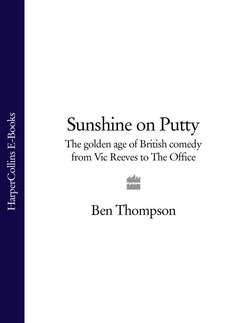Читать книгу Sunshine on Putty: The Golden Age of British Comedy from Vic Reeves to The Office - Ben Thompson, Ben Thompson - Страница 45
(a) Acting
ОглавлениеAs beguiling as Addison Cresswell’s vision (outlined at the end of chapter 2) of a plague of would-be thespians diminishing the purity of the comedic bloodline undoubtedly is, it is not strictly accurate. For one thing, there is a perfectly respectable tradition of successful comedic career cross-overs. It dates back to Queen Elizabeth l’s favourite jester Dick Tarleton (who moonlighted as a comic actor at James Burbage’s theatre in Shoreditch) and forward to Max Wall’s inspired inhabitation of the plays of Samuel Beckett and Les Dawson’s unforgettable 1990 appearance in La Nona, a thought-provoking TV film (based on an allegorical Argentinian novel of the same title) about a hundred-year-old woman so greedy that she eats her family’s furniture.
Comedians – like rappers – often make very good actors, because their day-job already entails presenting an idealized version of themselves. In the aforementioned Wall and Dawson examples, the genius of the casting was that it referred to attributes they already had – in the former’s case, a certain stone-faced stoicism; in the latter’s, a penchant for appearing in public dressed as a lady and a well-established liking for his dinners – while taking them to places they would never have gone of their own accord.
The challenge for a later generation – constantly besieged as they are by casting agents trying to pep up their callback lists – is to get the balance exactly right between something they are already and something that they definitely aren’t. In the case of Cresswell’s client Lee Evans, this means parlaying his bumbling stage act into a crisply marketable international big-screen persona. In the light of the rejection letter from Opportunity Knocks (which as far as starting at the bottom goes, just about takes the cake) thoughtfully reprinted in the programme for Lee Evans’s West End run at the Lyric Theatre, Shaftesbury Avenue in 1995, the effective and occasionally inspired big-screen performances Evans delivers in Peter Chesholm’s Funny Bones, the excellent Mouse Hunt and There’s Something About Mary – one of the biggest (and best) Hollywood comedies of the decade – must surely rank as game-raising of the very highest order.78
The comic/thespian transition does not go as smoothly for everyone.79 But for those who realize that there’s more to establishing your dramatic credentials than doing a couple of months in Art, acting can provide an outside chance of creative rehabilitation, even for those who seem wholly out of the running.
Take Paul Kaye, for example. Just when the damage his celebrity-stalker persona Dennis Pennis had done to standards of behaviour in British public life might seem to have rendered him utterly beyond the pale of respectable society, along comes BBC1’s Friday-night drama Two Thousand Acres Of Sky. In which, by exploiting his eerie resemblance to Marilyn Manson to superbly benign effect as the philosophically inclined new-age wastrel Kenny, Kaye secures an unexpected but entirely heartwarming form of redemption (as well as a series of Woolworths ads and his own entertaining game show).
As for those thespian wannabes so rudely fingered by Addison Cresswell, the case of Steve Coogan’s acting career is a complicated one, which will be dealt with in the fullness of time. As for Alan Davies, after a couple of false starts – notably that thing where he plays a disillusioned timeshare salesman sending home video postcards about his romantic conquests – his performances in Jonathan Creek and especially Bob and Rose eventually mark him out as a first-class comic (and even straight, dramatic) actor.
There is a clip of the younger Davies which always inspires high levels of hilarity when it gets shown on Before They Were Famous programmes. It’s an embarrassing ‘experimental’ student film he made while wearing a long Echo and the Bunnymen-style raincoat. And when you stop and think about what happened to the artistic aspirations of the mid-eighties as they were passed through the mangle of Thatcherite enterprise culture, it is hard to suppress a wry chuckle.
When the acting jobs didn’t come through straight away on first leaving drama college, Davies followed Norman Tebbitt’s advice, got on his bike and looked for work as a stand-up comedian, subsequently earning six-figure sums by making adverts depicting the Abbey National building society as a safe haven from the rigours of capitalism. In this context, the words ‘because life’s complicated enough’ could hardly be more apt.
